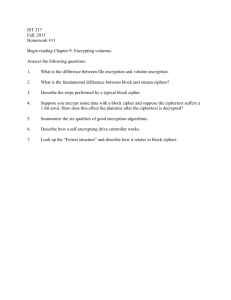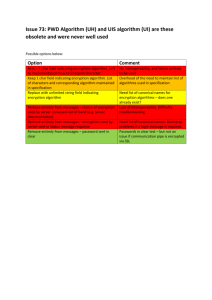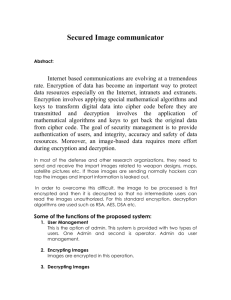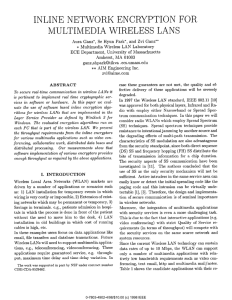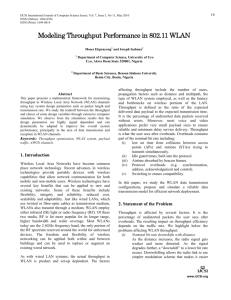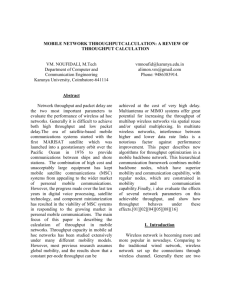Opportunistic_Encryption_A_Trade
advertisement
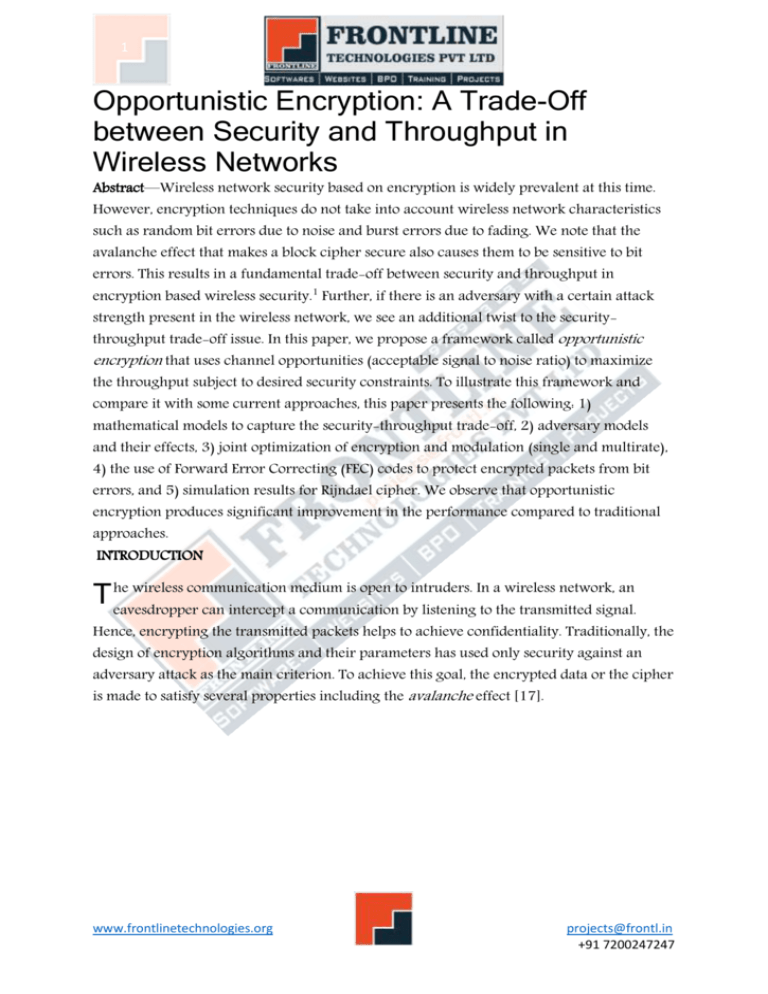
1 Opportunistic Encryption: A Trade-Off between Security and Throughput in Wireless Networks Abstract—Wireless network security based on encryption is widely prevalent at this time. However, encryption techniques do not take into account wireless network characteristics such as random bit errors due to noise and burst errors due to fading. We note that the avalanche effect that makes a block cipher secure also causes them to be sensitive to bit errors. This results in a fundamental trade-off between security and throughput in encryption based wireless security.1 Further, if there is an adversary with a certain attack strength present in the wireless network, we see an additional twist to the security- throughput trade-off issue. In this paper, we propose a framework called opportunistic encryption that uses channel opportunities (acceptable signal to noise ratio) to maximize the throughput subject to desired security constraints. To illustrate this framework and compare it with some current approaches, this paper presents the following: 1) mathematical models to capture the security-throughput trade-off, 2) adversary models and their effects, 3) joint optimization of encryption and modulation (single and multirate), 4) the use of Forward Error Correcting (FEC) codes to protect encrypted packets from bit errors, and 5) simulation results for Rijndael cipher. We observe that opportunistic encryption produces significant improvement in the performance compared to traditional approaches. INTRODUCTION wireless communication medium is open to intruders. In a wireless network, an T heeavesdropper can intercept a communication by listening to the transmitted signal. Hence, encrypting the transmitted packets helps to achieve confidentiality. Traditionally, the design of encryption algorithms and their parameters has used only security against an adversary attack as the main criterion. To achieve this goal, the encrypted data or the cipher is made to satisfy several properties including the avalanche effect [17]. www.frontlinetechnologies.org projects@frontl.in +91 7200247247 2 Architecture Diagram CONCLUSION The work presented in this paper shows that opportunistic encryption based on wireless channel states could lead to significant gains in the throughput achieved for a specified security constraint. Three different approaches are presented each with varying levels of channel knowledge. Both analytical and experimental results are presented. For the case where we assume the exact channel knowledge and continuous encryption block length, we get an improvement of 95 percent (around 5dB SNR) in the throughput over fixed block length encryption. REFERENCES 1. 2. J.M. Reason and D.G. Messerschmitt, The Impact of Confidentiality on Quality of Service in Heterogeneous Voice over IP Networks. Springer, 2001. B. Sklar, Digital Communications: Fundamentals and Applications. Prentice Hall, 1988. 3. 4. W.C. Jakes, Microwave Mobile Communications. IEEE, 1974. A.J. Goldsmith and P.P. Varaiya, "Capacity of Fading Channels with Channel Side Information," IEEE Trans. Information Theory, vol. 43, no. 6, pp. 1986-1992, Nov. 1997. 5. A.J. Goldsmith and S.-G. Chua, "Variable-Rate Variable-Power MQAM for Fading Channels," IEEE Trans. Information Theory, vol. 45, no. 10, pp. 1218-1230, Oct. 1997. 6. S. Boyd and L. Vandenberghe, Convex Optimization. Cambridge Univ. Press, 2004. www.frontlinetechnologies.org projects@frontl.in +91 7200247247 3 7. H.S. Wang and N. Moayeri, "Finite-State Markov Channel-A Useful Model for Radio Communication Channels," IEEE Trans. Vehicular Technology, vol. 44, no. 1, pp. 163-171, Feb. 1995. 8. C.C. Tan and N.C. Beaulieu, "On First-Order Markov Modeling for the Rayleigh Fading Channel," IEEE Trans. Comm., vol. 48, no. 12, pp. 2032-2040, Dec. 2000. 9. 10. L.I. Sennott, Stochastic Dynamic Programming and the Control of Queueing Systems. John Wiley & Sons, 1999. D.P. Bertsekas, Dynamic Programming and Optimal Control. Athena Scientific, 1995. www.frontlinetechnologies.org projects@frontl.in +91 7200247247
